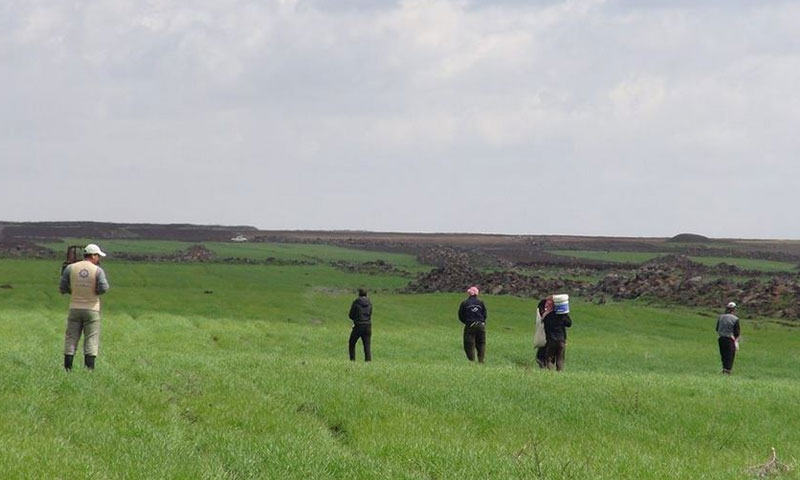



A state of recession covers the real-estate market in Southern Syria, imposed by the latest expansion by the Russian backed Assad’s forces in many parts of Daraa governorate, which in its turn affected the psychological status of the area’s people, as well as lands and agricultural areas’ purchase and sell contractions.
Still, the recession and its side effects did not extend all over the area, for it was met with a marked revival of the land purchase and sell operations in the parts adjacent to the occupied Golan. This engendered a number of questions concerning this common activity at the borders of the Israeli dominion.
The real-estate broker Abed al-Gazawi told Enab Baladi that the areas spread along the border lines with Golan have witnessed, in the past months, an unexpected activity of land sell and purchase, calling the situation “a reaction to the guaranties imposed by Israel that it will prevent the Syrian regime’s policy of control and displacing the people to its borders in the occupied Golan,” which triggered the agricultural land owners to offer their properties for sell.
Despite of the activity at the borders of Golan, the search journey for buyers is not an easy task and the prices are not sufficient.
Farmer Abu Qusai al-Numairi, who sold his land two months ago, said that he was forced to discount the price he demanded many times for the buyers are exploiting the seller’s need and due to the availability of the lands presented for sell.
Al-Numairi told Enab Baladi that a massive percentage of the agricultural lands near the towns of Swisah, al-Rafid and Beer Ajam, which are all towns in the governorate of Quneitra near the borders of Occupied Golan, are offered for sell, pointing out that the prices vary between one thousand and 2500 dollars per dunam.
According to al-Numairi the purchase/sell contracts differ based on the buyer, the seller and their ability to register these contracts, explaining that “there are people who require the registration of the contracts in the regime’s directorates. Only the non-persecuted by the regime can do that. Others register the contracts at the opposition affiliate Free Quneitra Local Council. Another large segment writes external contracts hoping that they will be able to register them on another time”.
The farmer pointed out that the goal of the majority of the buyers is to settle down and build a house on this land, for many of the people believe that the regime would not use heavy weapons and aircraft violently in the area because it is close to the occupied Golan, thus forming a “secure residential zone”.
Going back to the period between 2013 and 2014, it can be noticed that the process of agricultural lands’ selling and purchasing have become familiar after the spread of the opposition factions in the two governorates of Daraa and Quneitra, and the civilians and expatriates demand on the purchase process in preparation for the phase following the downing of the Syrian regime, as they believed would happen.
Nevertheless, the direct Russian intervention on the side of Assad’s forces in 2015 and indulging the Iranian militias in the battles of the Death Triangle area (Connecting Daraa, Quneitra and Damascus),in addition to the intensified shelling and the destruction that befell the two governorates of Daraa and Quneitra brought the state of recession back to the market, backed with a fear of a future that does not have clear features, in parallel with a policy based on enforced displacement and demographic changes.
Al-Gazawi, as an example of the repercussions which resulted from the above mentioned scenario, refers to what happened in Khirbet Ghazaleh, Ataman, al-Shaykh Maskin and Daraa, where people lost all hope of a return to their homes, which paralyzed the buyers and stopped the market almost entirely, despite the presence of selling contracts that the broker described as “limited.” A few areas only witnessed these operations and for very low prices that fundamentally took place because the owners needed the very little amount of money given to them as a price for their lands.
Many reasons lie behind people’s offering their lands for sell. According to al-Gazawi, the deterioration of many people’s financial situation has led them to sell their lands for small returns if compared to their real prices, which is an actual opportunity for those who would like to buy.
Refugees and expatriates are also under the category of those who wish to sell their properties, believing that their assets inside Syria are “frozen” and that they would not return to them soon. Accordingly, they prefer to sell them and utilize their money in the countries of refuge according to the broker.
Al-Gazawi pointed out that a group of expatriates, whose income is high if compared to the deterioration of the Syrian pound, in addition to some merchants are exploiting the decrease of the lands’ prices in the meantime to own these properties, hoping that the prices would rise to their original state in the future.
if you think the article contain wrong information or you have additional details Send Correction